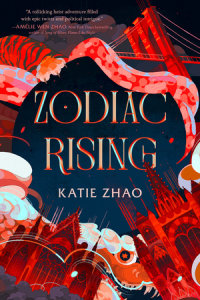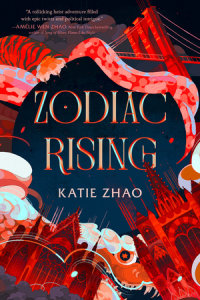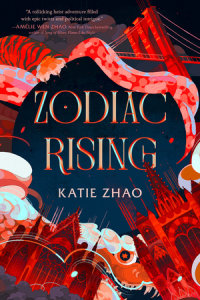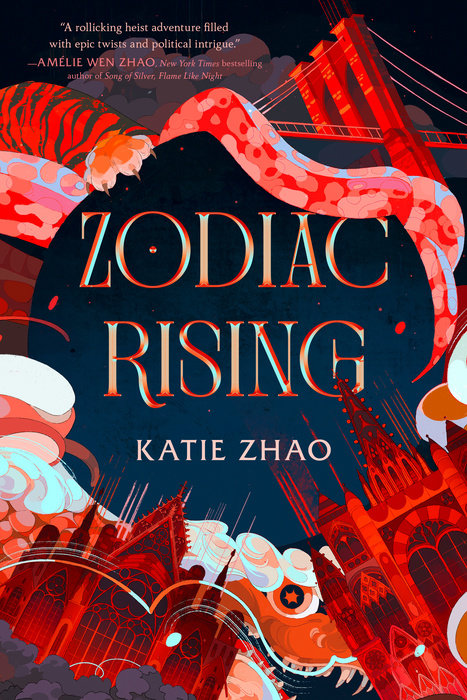Zodiac Rising
Author Katie Zhao




Zodiac Rising
Zodiac Rising is a part of the Descendants of the Zodiac collection.
Magic meets dark academia at a New York boarding school that’s hidden from mortal eyes. When a student is killed over priceless treasure, the Descendants of the Zodiac assemble a crew to avenge their classmate's murder and heist back what's rightfully theirs. Perfect for fans of A Deadly Education and Legendborn.
“A rollicking heist adventure.” —Amélie Wen Zhao, New York Times bestselling author of Song of Silver, Flame Like Night
At a secret Manhattan boarding school, the…
Magic meets dark academia at a New York boarding school that’s hidden from mortal eyes. When a student is killed over priceless treasure, the Descendants of the Zodiac assemble a crew to avenge their classmate's murder and heist back what's rightfully theirs. Perfect for fans of A Deadly Education and Legendborn.
“A rollicking heist adventure.” —Amélie Wen Zhao, New York Times bestselling author of Song of Silver, Flame Like Night
At a secret Manhattan boarding school, the Descendants of the Chinese zodiac have hidden away since the source of their magic—the twelve zodiac statues—was vandalized and lost to time. Thus, a curse befell the Descendants, and they’ve lived as creatures of darkness . . . until now.
When the lost statues suddenly resurface and a powerful classmate is found dead, all signs point to foul play from the fae. The Descendants finally have the chance to take back what's rightfully theirs and break the curse. But to pull off this deadly heist, they must assemble an elite crew:
THE VAMPIRE: After a century of burning hunger, Evangeline is out for blood.
THE SHAPE-SHIFTER: Nicholas yearns to restore justice to his people—and make peace with his past.
THE MORTAL: Alice seeks the truth of her mysterious heritage, and this mission may be the key.
THE WEREWOLF: Tristan will do anything to break free from the monstrous wolf inside.
Only these four have the power to save the Descendants, but the wrath of the fae waits at every turn. One wrong move and the fate of their kind will come crashing down. . . .
An Excerpt fromZodiac Rising
1
Julius
Julius Long was no stranger to being thrust into unexpected, potentially dangerous situations. In fact, he was something of an expert on navigating—and evading—danger. For decades now, Julius had guarded the legacy of the wealthy Long family, one of Manhattan’s most powerful players, which had primed his abilities to improvise and survive perilous plights by the skin of his teeth.
It was shortly after sunset on a school night, and Julius had cut class to come out to the glittering Brooklyn Bridge to wait for someone who might not show up—or, worse, someone who might show up to put an end to him once and for all.
Julius had told no one about his plans for the night. Not his combat teacher, Elder Hou, who was doubtless already worried by Julius’s unexplained absence. Not his Talons, his eight-member gang, who were at his beck and call and who controlled the streets of Chinatown. Not even his younger sister, Evangeline. Oh, he’d left a note behind for Evangeline—he couldn’t shake off the thought that…
1
Julius
Julius Long was no stranger to being thrust into unexpected, potentially dangerous situations. In fact, he was something of an expert on navigating—and evading—danger. For decades now, Julius had guarded the legacy of the wealthy Long family, one of Manhattan’s most powerful players, which had primed his abilities to improvise and survive perilous plights by the skin of his teeth.
It was shortly after sunset on a school night, and Julius had cut class to come out to the glittering Brooklyn Bridge to wait for someone who might not show up—or, worse, someone who might show up to put an end to him once and for all.
Julius had told no one about his plans for the night. Not his combat teacher, Elder Hou, who was doubtless already worried by Julius’s unexplained absence. Not his Talons, his eight-member gang, who were at his beck and call and who controlled the streets of Chinatown. Not even his younger sister, Evangeline. Oh, he’d left a note behind for Evangeline—he couldn’t shake off the thought that this dangerous decision might be his last. Strolling into what was almost certainly a trap was a rash and irresponsible gamble on his part—a move that was most unlike him, the levelheaded Chancellor who headed the High Council at Earthly Branches Academy.
Julius hadn’t slept or fed on blood in days. He didn’t really need the sleep, as vampires could operate fine without rest, but he found himself regretting not downing one last blood bag before heading out tonight. Well, it was too late for regrets now. No matter what, Julius would see through his duty to his people, the Descendants.
“Gou, Ji, Yang, She, Long,” Julius said into the shadows, as he had been instructed. Dog, rooster, sheep, snake, dragon.
For a long moment, only silence answered. Then the quiet was broken by the sound of chatter. A pair of people, a homeless man and woman by the looks of their disheveled clothing, walked by. They threw Julius a curious look.
“What’re you looking at?” Julius grumbled, and the pair hurried off.
Annoyance welled within Julius as he gazed upon the abandoned building in front of him. It was once the site of the Fulton Fish Market, but now the old building stood silent, left to crumble and rot. It was also the site of Julius’s appointment, except it was past 8 p.m. now, and the appointer was nowhere in sight. If there was one thing Julius despised, it was having his time wasted.
The only reason Julius had come tonight was the magical stationery that had appeared on his desk the day before. It was a sign, he’d thought, the sign he had been waiting for. At long last, the five missing bronze zodiac statues—dog, rooster, sheep, snake, dragon—had surely been found. Whoever had sent the note was no doubt a powerful being capable of great magic. A shaman, perhaps. More likely, the note had come from a faerie. It would explain why the note had been covered in glimmering magical dust. But the dust could very well be a red herring.
Well, no matter. In moments, Julius would have his answer.
Come alone to the building where the Fulton Fish Market used to be, near the Brooklyn Bridge on South Street between Beekman and Fulton Streets, at 8 p.m. sharp tomorrow. I have information about the five missing zodiac heads. Announce your presence to me by naming the heads, and I will give you that which you desire—for a price.
The note had burst into fire and burned into nothingness shortly after Julius read it, but thankfully his sharp memory retained the contents of the message. It was a risk coming out here, but it was a risk Julius was willing to take. The fae hadn’t communicated with the Descendants in decades. He needed to see for himself why that had changed. Why now, of all times, they’d decided to come forward with information regarding the missing fountainheads.
After receiving the note, Julius had rushed about the estate, taking care of as many affairs as possible, tying up loose ends. He did his best to behave as though it were business as usual, especially in front of Evangeline. Julius’s darling little sister mustn’t know that he was swimming through dangerous waters. Not until it was necessary for her to know. He would do anything to protect and help her—even when he knew she wouldn’t agree with his actions. That was why, against his every instinct, Julius had traipsed out here tonight.
A hoarse whisper floated on the wind, entering Julius’s ear.
“My, how obedient you are, Descendant.”
That voice. He could’ve sworn he recognized that voice, though he couldn’t quite place it. Was it one of the fae he’d clashed with during and after the Opium Wars? Julius’s memory was exceptional, yet even he could not recall specific details from the battles he’d fought over a century ago. Back then, the shamans were waging a turf war with the fae in Chinatown, which ended in neutrality in the 1930s. Both had kept to themselves afterward, with the shamans disappearing into the Underground and the fae taking up residence north of Fifty-Ninth Street. As immortals who were proud of their magic and legacy, the shamans and fae particularly detested supernatural beings who had once been human, like the Descendants. In fact, following the turf war, the shamans and fae agreed, for once, that it was in each of their best interests never to align with the Descendants, to do whatever they could to keep the Descendants from growing too powerful.
In this manner, the supernaturals reached an uneasy truce. The difficult thing about an uneasy truce, however, is that any single incident can upset the balance.
Tonight, Julius thought, could be that upsetting event.
Julius clenched his hands into fists, whirling around. This being, whoever they were, brimmed with ancient magic. He sensed the energy humming in the air, subtle but sharp. He felt it deep in his bones. And he knew instinctively, too, that on this night—an otherwise innocuous summer night, a night like any other—he had arrived, at last, at the point of no return. He had delivered himself to Death’s doorstep, in fact. The knowledge didn’t frighten Julius. It electrified him.
Twelve powerful families—no, all of China and its diaspora—had waited decades for an answer, for justice, for anything at all to be done in the wake of the ruination of the Old Summer Palace. Now Julius sensed that he was finally on the brink of uncovering something revolutionary. The question was—would he survive to carry the message back to his people?
For once in his life, Julius did not have the answer.
The messenger emerged out of thin air, wearing emerald robes that shimmered with golden light at the ends of his sleeves. His long white-blond hair floated around him. His skin was the palest snow, glowing with an ethereal light, and his eyes were the black of eternal night. A faerie, indeed.
Julius had to force himself to glance away from the faerie, lest his beauty blind him or drive him mad. He knew the tricks of the fae—knew that their glamour made them appear even more beautiful than they were—and yet, for all his decades of knowledge, he still found himself vulnerable to faerie beauty. Perhaps the immortals were right. Perhaps those who were once mortal would always bear their mortal weaknesses.
“You are the one who sent the note?” asked Julius, his voice hoarse. He cleared his throat and straightened his shoulders, drawing himself to his full height. He felt tiny next to the faerie, and hideous compared with his beauty. But Julius had to at least appear to be in control of the situation, and he quite excelled at this after more than a hundred years of practice. “You told me you had information about the missing zodiac fountainheads.”
“I do. In fact, I know exactly where they are.” The Mandarin rolled off the faerie’s tongue as smoothly as though it were his native language, but Julius knew the truth: the fae were extremely intelligent and worldly creatures who needed only to overhear one foreign conversation in order to smoothly incorporate it into their linguistic repertoire. The faerie’s voice was high and wispy, and it had a lyrical quality, like a song—an enticing melody that could easily ensnare Julius, if he wasn’t careful.
“The fountainheads are together? All five of them? In Faerieland?” For a moment, Julius’s disbelief overcame the power of the faerie’s aura. He hadn’t expected all five missing fountainheads to be together; he thought, coming here tonight, that he’d learn information about one or two at best.
The faerie nodded. “Do not accuse the Folk of being thieves,” he continued as though he’d read Julius’s mind, his words adopting a sharp, biting quality. “We merely intercepted the British soldiers—the true culprits.”
Still, you did not come forward until now, Julius thought spitefully, but he managed to restrain himself from retorting aloud. Instead he smoothed over his features. The first trick to successfully doing business, which his own father had taught him over a century ago, was mastering the poker face. Showing emotion was as good as giving the other party the upper hand.
“Well,” Julius said, a bit of snark oozing into his voice despite his best efforts, “I am unsurprised that the fae have secretly had possession of Descendant property, given how your kind is . . . mischief-prone.”
The faerie covered his mouth with a slender hand, and he began to laugh. That, too, sounded like music, which both pleased and irritated Julius no end.
“Why are you coming forward now?” Julius asked, eyes narrowed in suspicion. “Why are you helping me?”
“The fae do not all think alike. We are not a monolith. We do not all believe that pillaging and thieving are proper conduct.”
“Could have fooled me,” Julius muttered. From what he’d seen, the fae never cared about anyone besides themselves, but they did enjoy the opportunity to make fools out of the shamans. “So how can I find the fountainheads?”
The faerie scoffed. “You can’t find them. Or rather, I should say, you aren’t the one meant to bring them back to your people.”
“What’s that supposed to mean?” Julius asked sharply.
“A faerie Seer delivered a prophecy to the High Council of the Descendants one day and one night after the Circle of Twelve was broken.” The faerie’s voice grew lower and more ethereal, and he closed his eyes as he recited the words that Julius had heard so long ago: “The key to restoring glory rests with Midsummer’s sprout; but if greed sows discord, harmony will be in doubt.”
“I know, I know. I was already Chancellor of the High Council by then. I heard that prophecy in person.” Every Descendant knew about this prophecy, so Julius wasn’t sure why the faerie was rambling on about such matters of common knowledge. He tried to bite back his impatience, but this proved very difficult, as it had been well over a century since the Circle of Twelve had been cruelly broken, and now, at last, he stood a chance of reclaiming the might that rightfully belonged to his people—if only this creature would stop talking in riddles.
Now the faerie’s eyes fluttered open, and they had, alarmingly, changed color from black to white, like two glowing orbs against the dark of night. Ignoring Julius’s frustration, he continued. “The Seer then stated that he would make a reappearance when the time was nigh, when the full moon coincided with the summer solstice during the Midsummer Celebration. He would claim the soul of a worthy Descendant in exchange for the successful completion of the prophecy.”
